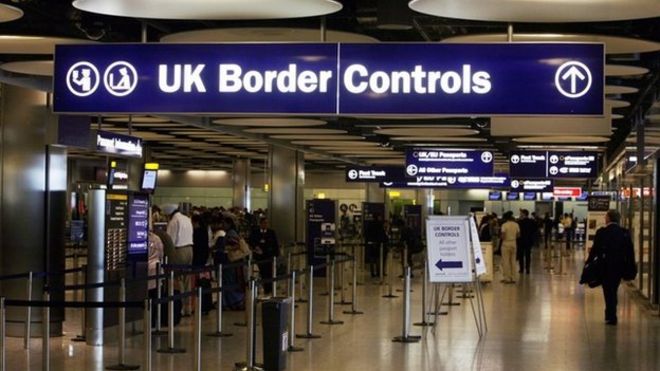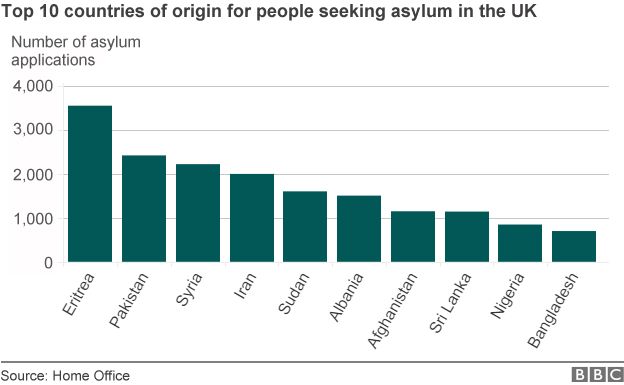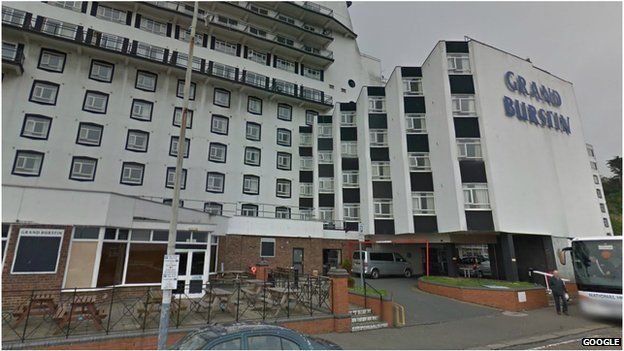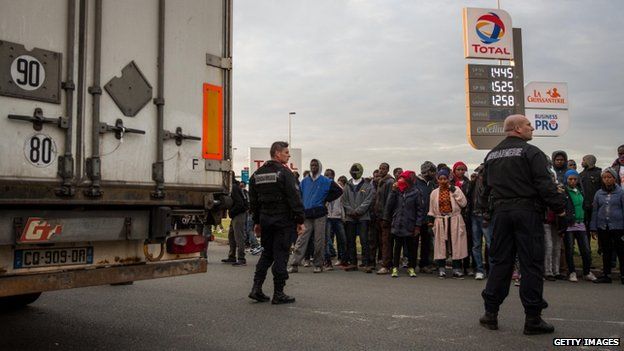The process for claiming asylum in the UK can be a long and complex one. What happens when asylum seekers arrive in the country?
Thousands of migrants, many of whom want to seek asylum, have attempted to enter the Channel Tunnel to make their way to the UK.
An asylum seeker is someone claiming to be in fear of persecution on the grounds of race, religion, nationality, membership of a particular social group or political opinion.
They must also be outside and unable to seek protection from their country of origin.

How do they claim asylum?
Asylum seekers must present themselves to authorities “when you arrive in the UK or as soon as you think it would be unsafe for you to return to your own country”.
If people are caught by police, they are at first arrested on immigration offences. Immigration officers will submit an application on behalf of those seeking asylum.
As part of the process, those seeking asylum will be asked to explain how they were persecuted in their home country and why they are afraid to go back.
They will also be expected to provide any documentation which supports their claims.

Where do asylum seekers come from?
In 2014-15, the largest number of claims came from Eritrea (3,552), Pakistan (2,421) and Syria (2,222).
The UK has a list of countries that it deems safe. This means that they can reject claimants originating in these countries without a right of appeal. They may also be detained until they can removed.
This de facto whitelist includes Ukraine, India and South Africa, and Nigeria, Kenya and Ghana for men only.

Where do they stay?
Those deemed to have legitimate claims for asylum are put into accommodation provided by the Home Office if they need it while their claims are considered.
This can be provided by a government contractor or in some cases temporary accommodation like hotels.
Under the Detained Fast Track system, applicants stay in detention centres, also called immigration removals centres, which are run by HM Prison Service.
A person can also be detained at any point in the asylum process if UK Visas and Immigration believes that their case is straight-forward.
Refugee advocacy groups argue that detention can damage the mental health of those who may have suffered persecution, rape or torture in their home countries.

Do they get financial help?
People awaiting an asylum decision are given an allowance to live on.
As well as housing assistance:
- A single person gets £36.95 per week
- A single parent with one child gets £73.90
- A single parent with two children gets £110.85
- A couple with two children gets £147.80
The amounts were recently reduced by the government.
Asylum seekers are not permitted to work in the UK. But if their asylum claim takes more than a year to be processed, they can apply for the right to work.

How long do they wait?
The government aims to process simple claims within six months, but there are cases that have lasted years, with legal challenges further delaying decisions.
The Detained Fast Track system played a key role in immigration removals and meant some people could be made to leave the country in about 22 days.
But the High Court deemed the system unlawful in June, saying that its speed put applicants at a “serious procedural disadvantage”. Asylum seekers have previously stayed at the Grand Burstin hotel in Folkestone, Kent
Asylum seekers have previously stayed at the Grand Burstin hotel in Folkestone, Kent

How many are accepted?
There were 25,020 asylum applications in the UK in the year up to March, a 5% increase on the previous year.
Asylum or an alternative form of protection was granted in 40% of cases – up from 36% the year before.
Permission can be granted for a person and their dependants to stay in the UK for five years either as an asylum seeker or for humanitarian reasons.
After five years asylum seekers can apply to settle in the UK.
Permission can also be granted to stay in the UK if the person does not qualify as an asylum seeker or for humanitarian reasons, with the government deciding the length of the stay based on the person’s situation.

What if their application is refused?
If a claim is rejected, the government begins the process of removing the asylum seeker from the UK.
Some are offered money to leave voluntarily.
Depending on the nature of their claim, they may be put in a detention centre. They may also be kept in accommodation provided by a government contractor.
Removal can be complicated by legal challenges, as many will be vulnerable and may have suffered abuse or torture.
It can also be a lengthy process to get new identification documents issued by countries of origin.

Why don’t Calais migrants claim asylum in France?
UK politicians have said the migrants in Calais should claim asylum in France if they need protection.
But many migrants say their life in France is “no good”, and they hope for better opportunities in the UK.
Under EU rules, asylum seekers should claim asylum in the first safe country they come to.
Biometric fingerprinting means that many who make it further into Europe will end up being sent back to Italy or Greece, where many first entered the EU. Migrants in Calais have been trying to get to the UK by stowing away on lorries
Migrants in Calais have been trying to get to the UK by stowing away on lorries
































